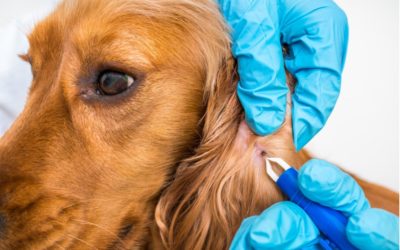Blog
We feel it is important to educate our pet parents. There are so many things you can do to keep your BFF healthy and happy. New articles are added each month, so please visit our ‘knowledge center’ often.
How to Plant a Pet-Friendly Garden
Whether you love to garden or just enjoy the summer weather and blooms, this information is helpful in keeping your pet safe and away from outdoor hazards. Harmful Garden Products Chemicals and Poisons: One of the top gardening dangers for your pet is chemicals or...
How to Help Prevent Lyme Disease in Your Pets
Tick Season Has Arrived in Texas As weather starts warming up, we are heading into prime tick season. With tick season comes more cases of Lyme disease. Since Lyme disease is quite serious and May is National Lyme Disease Awareness Month, we wanted to educate you...
Heartworm Prevention in College Station, Texas
April is the month dedicated to Heartworm Prevention! This is a time of year where we start seeing an increase in heartworm disease diagnoses. While heartworm disease is more easily transmitted in the warmer months, it is essential to understand that pets can contract...
Common Pet Poisons: How to Keep Your Pet Safe
March is Pet Poison Prevention Month. As part of our ongoing mission at College Hills Veterinary Hospital, we would like to talk this month about common pet poisons and what you can do to keep your pet safe. Cleaning Products Many cleaning products are fine to use...
PET TEETH: DENTAL CARE FOR YOUR PETS
Your Pet’s Dental Health is Extremely Important Pet dental health is essential for your pet's overall wellness and longevity. Most dogs and cats have some degree of periodontal disease by age three. If left untreated, these patients are at an increased risk for...
Obesity in Pets
Obesity is perhaps the most complex, challenging, and, ultimately, one of the most important medical conditions in both human and veterinary medicine. Nearly 60% of cats and 54% of dogs equaling over 50 million cats and 42 million dogs are at risk for weight-related...
Holiday Safety Tips for Family Pets
The holidays are here, so I would like to take a few moments to remind pet owners in the College Station and Bryan area to stay alert for seasonal hazards related to our pets. There’s nothing worse than a pet accident when we’re all trying to have a nice holiday...
Pet Wellness Exams for College Station, TX
Your pet can benefit greatly from regular wellness examinations or checkups. Whether your pet is a youngster, a “senior citizen,” or any age in between, a wellness exam is an essential part of their healthcare. A wellness exam allows us to conduct a thorough physical...
Pet Disaster Preparedness for College Station, TX
Disasters Happen. Severe storms, tornadoes, flooding, fires and even ice storms have occurred in Bryan and College Station, Texas. Not being prepared can lead to devastating outcomes for families and the first responders that put their lives on the line. You should...
MLS® Veterinary Therapeutic Laser
When a physical condition or injury affects your pet’s mobility or quality of life, there is one goal: A rapid return to every-day activities. College Hills Veterinary hospital is proud to be on the medical technological forefront by offering MLS Laser Therapy. We...
What Are These Lumps, Bumps, and Growths on My Pet?
It is worrisome to find a lump, bump, or growth on your pet. However, abnormal growths on top of, within, or just below the skin are commonly discovered in dogs and cats. Finding one does not necessarily mean bad news. Knowing what to watch for, and what you can do if...
Hot Weather is Here
Keep Your Pets Safe! Summertime is always fun in Texas. Families are firing up the BBQs, swimming, or perhaps spending the weekend going river-tubing. There are tons of activities to keep you and the family busy this time of year. However, with temperatures in the...












